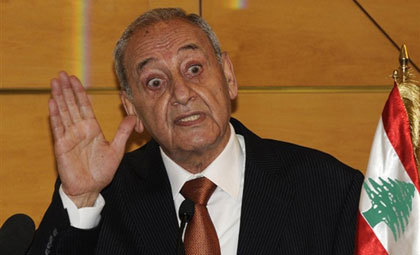 Parliament Speaker Nabih Berri hailed Maronite Patriarch Beshara al-Rai’s stance that considered the controversial 1960 electoral law as the alternative to another extension of parliament’s term and criticized the latest electoral law proposed by Free Patriotic Movement chief Gebran Bassil.
Parliament Speaker Nabih Berri hailed Maronite Patriarch Beshara al-Rai’s stance that considered the controversial 1960 electoral law as the alternative to another extension of parliament’s term and criticized the latest electoral law proposed by Free Patriotic Movement chief Gebran Bassil.
“Al-Rai made a rational statement when he said that the alternative to extension is the re-endorsement of the 1960 law,” Berri’s visitors quoted him as saying in remarks published Sunday in the al-Hayat daily .
“When the patriarch says that the 1960 law is the alternative to extension, this means that it is also the alternative to vacuum. I’m not saying this because I support the 1960 law and I was the one who said ‘no to the 1960 law, no to extension and no to vacuum’,” Berri added, according to his visitors.
“A law can only be annulled through another law. This is a constitutional principle… Through what logic should we annul the law that is in effect if there is no alternative law?” Berri stated.
The Speaker added that he is waiting for the political parties to reach an agreement over a new electoral law within the time frame allowed as a result of President Michel Aoun’s parliament suspension .
Turning to Bassil’s electoral law proposal, which involves sectarian voting in its first round, Berri accused the FPM chief of seeking to “block the election of some Christian candidates .”
“That’s why it is not right to say that there is a Christian-Muslim problem over the law, seeing as it has to do with the situation in the Christian arena,” Berri added.
Similarly Progressive Socialist Party leader MP Walid Jumblatt slammed on Thursday the most recent proposed electoral law as “divisive” and the product of a “sick mentality.”
The so called ‘qualification law’ was reportedly proposed initially by Speaker Nabih Berri several months ago and is now being endorsed and proposed by Bassil.
In the first round, voting takes place in the current 26 districts ( as per the 1960 law) and voters can only vote for the candidates of their own sect . Two candidates for each sectarian seat qualify for the second round during which voting would take place in 10 newly-defined electoral districts and according to a non-sectarian proportional representation polling system.
The 10 newly-defined electoral districts are: Akkar, North, Baalbek-Hermel, Zahle-West Bekaa, Northern Mount Lebanon (Jbeil, Keserwan, Metn, Baabda), Southern Mount Lebanon (Chouf and Aley), Beirut 1 (Ashrafieh, Rmeil, Medawwar, Marfa, Saifi, Bashoura), Beirut 2 (Ras Beirut, Dar el-Mreisseh, Mina el-Hosn, Zoqaq el-Blat, Mazraa, Mousaitbeh), South (Sidon, Tyre, Zahrani, Jezzine), and Nabatiyeh (Nabatiyeh, Bint Jbeil, Marjeyoun, Hasbaya).
Bassil said the main political parties have agreed to adopt the ‘qualification law’ and are seeking its approval by everyone

Leave a Reply
You must be logged in to post a comment.